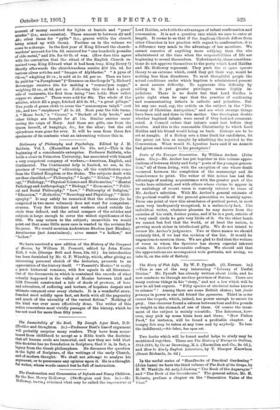Lord Halifax, sets forth the advantages of infant confirmation and
communion. It is not a question into which we care to enter at length. It seems to tis that if the Anglican Church differs from other Churches in her practice with regard to confirmation, it is a difference very much to the advantage of her members. We cannot conceive of anything more edifying than the rite administered at the time when the responsibilities of life are beginning to reveal themselves. Unfortunately, these considers- tions do not approve themselves to the party which Lord Halifax and Mr. Holloway represent. They push the ex opere operate theory to an extreme which, could they get their way, would be nothing less than disastrous. To most thoughtful people the actual conditions under which baptism is administered present a most serious difficulty. To aggravate this difficulty by adding to it yet greater privileges seems highly in- judicious. There is no doubt but that Lord Halifax is quite right when he says that the practice of confirming and communicating infants is catholic and primitive. But let any one read, say, the article on the subject in the "Dic- tionary of Christian Antiquities," and see what strange things have been said and done in this matter. One theologian doubts whether baptised infants were saved if they had not communi- cated. A Council orders that infants must fast before they receive. And this is the reasonable Christianity to which Lord Halifax and his friend would bring us back. Bishops are to be set at naught. If a Bishop sets a time limit for candidates, let the priest set him at naught by admitting the rejected to the Communion. What would St. Ignatius have said if an Asiarch had given such counsel to his presbyters ?














































 Previous page
Previous page